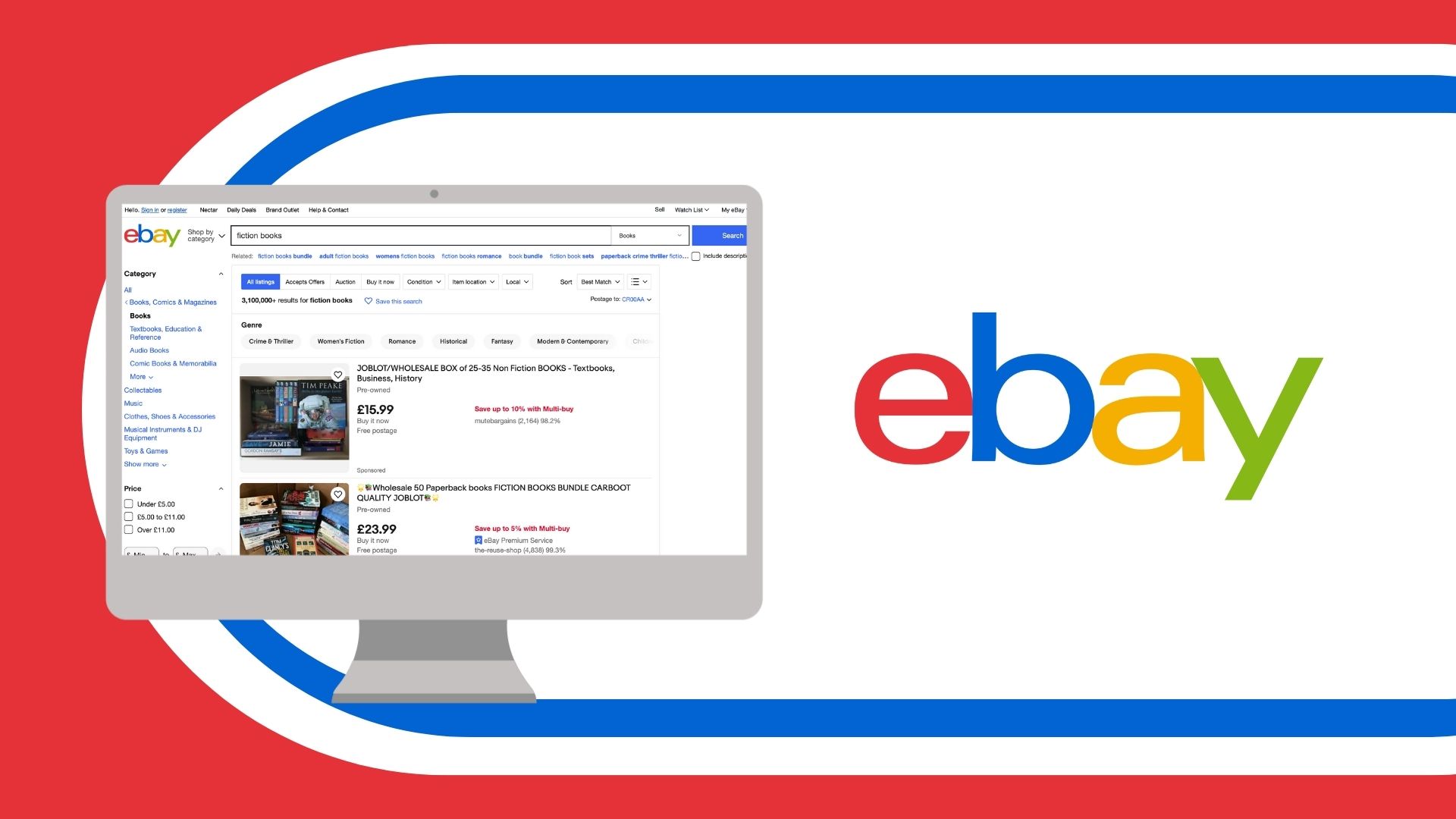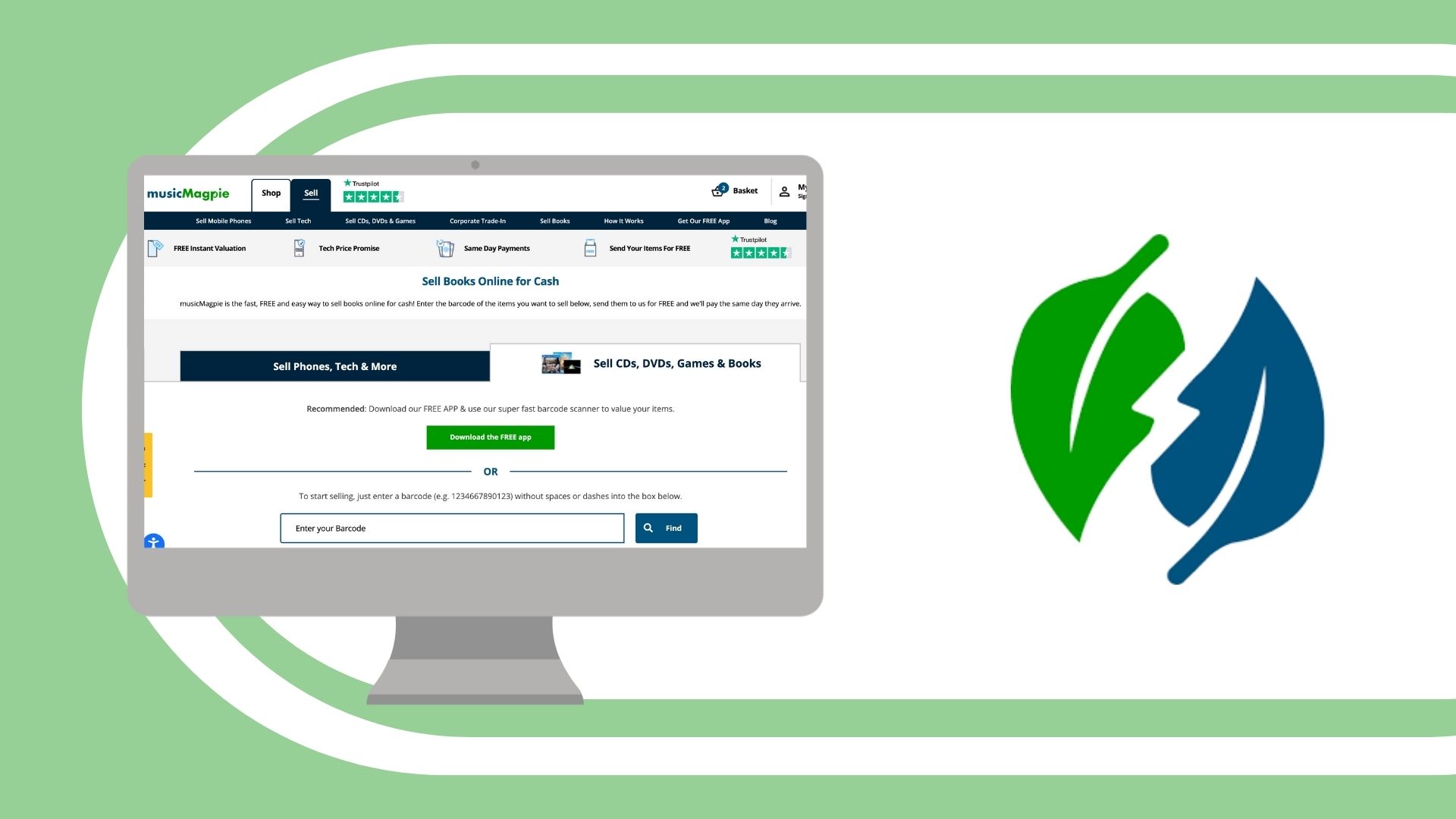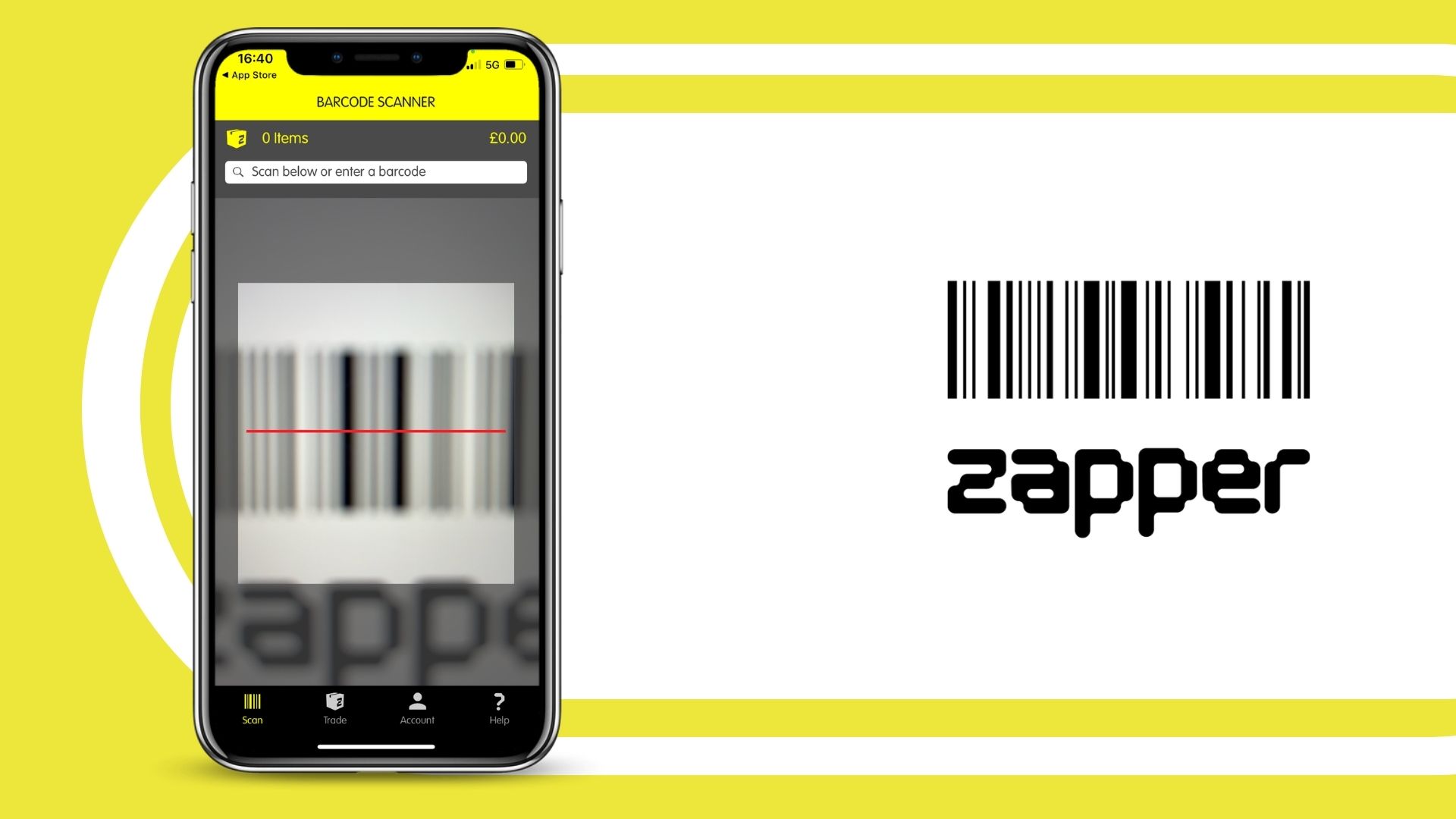
Finding yourself quickly running out of room for your ever-growing book collection but reluctant to give away your old favorites? Well, don't throw them away just yet as you may be able to make some money from selling your books online.
By selling your books, not only are you freeing up space for the next bestsellers but you're also getting some cash for it too. It really is a win-win situation. However, it's hard to know how to get started and crucially, how much money you can *actually* make from it.
Luckily, if you're looking to declutter your books, we're here to help with the daunting world of online reselling with our expert guide on the best websites to use, and a breakdown of how much money you could bring home for your old titles.
How to sell books online: The best websites and apps
These are the best apps and websites to use if you're looking to shift your old books And, if you're in the process of decluttering your home more generally, check out our guide on how to sell your clothes online too.

Perhaps an unexpected choice but Depop isn't just just one of the best apps to sell your old clothes, it's also a great place to make some money for your old books too. Whether you’re using the app or the site, there are no listing fees and you don’t particularly need a following to start selling. The company does however take a 10% cut from your individual sale and you as a seller are responsible for all postage and packaging costs.
When creating your listings, there a few things to keep in mind. One is the size and weight of the book you're listing. The bigger and heavier the book, the more it will cost you to post it, so your profit margin could be small. You can weigh it at home and look on your chosen mailing service's website to see how much they will charge. Or if you want a precise price, you can always take your package to the postage store and have them weigh it for you. For example, if you're US-based, UPS's small box flat rates start at $10.20 and increase depending on weight per pound. If you're UK based and want to use the Post Office, prices for a small parcel up to 2KG start at £3.49. Once you have the price of postage you can alter your listing to cover it. You can also decide whether you want to offer international shipping. If so then you will have to raise your postage prices. Again, check mailing websites for prices.
Speaking from personal experience, popular books and ones that feature on the curriculum are more likely to sell, rather than discontinued, dated or older titles. A big advantage of Depop is that people are generally willing to pay slightly more for better quality books, so if yours are in good condition, you may be able to list them for a little bit more money.
Once you've worked out postage and packaging costs, along with Depop's cut, you can start to work out your profits. Listings for used fiction books range from $1/£0.80 to $12/£10. If your copy is in great quality, is a desired special edition or has a particularly sought-after cover design then you can raise your price accordingly.
On average, if you list a book for $2.50 / £2 with an accurate postage fee you're looking at around $2 / £1.60 coming into your bank account. Of course, this depends on the seller being willing to pay the full postage and listing fee - so bear in mind that these two costs combined must be competitive.

Depop’s current rival in the secondhand clothing business is also ramping up its popularity in book and furniture sales. Vinted is a great site for sellers, with no listing fee or cut of sales being taken. Instead of seller fees, the buyers pay for the postage and pay a 3% to 8% buyers fee to Vinted with each purchase they make. So you as a seller get all the profit! The postage process is a little easier too as you can drop your parcel off at various postage points, rather than having to hunt out a Post Office.
There is however a slight disadvantage and that is the price expectations that come with Vinted. Unfortunately for sellers, most buyers are looking for a bargain and a big one at that. So, when it comes to listing your secondhand books you probably won’t be listing them for anything more than $6/£5. Vinted then, is your one-stop shop for quick, easy and cut-free sales. Just don’t expect to earn hundreds from it. On the flip side, if you're trying to shop more sustainably, it's also a great place to buy books for low prices.

Facebook Marketplace has shot to popularity for its addictive bargains and unique furniture finds. However, surprisingly, the site’s book section is one of the most successful when it comes to sales. There are no listing fees and they don’t take any cuts from your sales so you take home all of the money. Plus, there's also the option to sell your books for cash should you want to complete the buyer transaction in person (and skip postage costs).
It's worth pointing out that in-person transactions come with risks, one of them being the safety issues that come from meeting a stranger from Facebook. It might sound obvious but it’s a good idea to meet a potential buyer in a public space like a coffee shop or local high street. If you want them to come to your home then make sure you’re not alone. Also keeping the payment as cash means there’s no further need to swap any details and the transaction can be as quick as swapping the book for the money.
Should you want to stick to online transactions, using payment apps like PayPal is a more secure way of receiving money than a simple bank transfer. If you take this route, do keep in mind packaging and postage costs as you will need to send off the book to the buyer yourself. These costs will vary on the dimensions and weights of your packages as well as which mailing service you use.
Similar to Vinted, buyers on Facebook Marketplace are not expecting large ticket items. Saying this, if you are able to sell your books in bundles or prove their quality and or unique worth then there will be users happy to spend a little more. Facebook Marketplace also efficiently links up to your Facebook Messenger app so there’s a safe and easy-to-navigate chat for those all-important price negotiations.

eBay has been around for a while now and there’s a reason why. It’s hugely popular with both second-hand sellers and buyers due to the variety of listings and the success rate of sales. And, when it comes to listing books it’s a lot easier than you might imagine.
When you create your listing, eBay will give you the option to find a pre-existing one on the site that matches your book. Once you've selected the right one, the site will automatically fill in all the title, author and description fields for you. Great, right?
Similar to the sites above, eBay buyers will pay extra for more valuable copies and books that have been kept well. However, prices for really common titles rarely reach over $6/£5 due to how many sellers list them. It's also good to take into consideration that eBay is an auction site, so with each listing there is a risk that you'll get low bids or in some cases, none.
Similar to Depop, you have to cover your own postage costs on eBay, so weigh and measure your packages in advance to get an idea of how much to charge. It's recommended that you include your postage cost within your listing price so you can advertise free shipping - a bonus for shoppers.
With accurate postage pricing and sought-after titles, eBay is the best place to earn more money for your collector-friendly copies. Some hardback special editions of Jane Eyre have sold for $31/£25 and above - so even considering the 6% cut eBay takes and the cost of listing, you can still make a respectable profit.

Amazon is definitely one of the most popular places to buy books, but what about selling? Well, if you want to take your side hustle seriously, then it could be the site for you.
Amazon allows you to become an Amazon bookseller and set up your own online store if you want to sell second hand books. It comes at a cost though: to get started, you'll need to sign up for a monthly subscription which starts at $31/£25.
There are however quite significant sales cuts from Amazon with each book sold. If sales are under $6/£5 Amazon will take 5.1%, however, if the listing is over the threshold of $6/£5 then the company will take a 15.3% cut from your profits - which can really add up. So this is a choice for serious sellers who want to sell high volumes.
When it comes to shipping, Amazon offers a few options. If you want to fulfill your own shipping and set your rates, you need to be signed up for the 'professional' plan. Those on 'individual' plans are provided with an estimated shipping price which you have to use. If you're still on the fence, Amazon provides an in-depth pricing and help guide for new sellers to read.

WeBuyBooks undoubtedly wins for convenience. Via a handy app, you can get a valuation on your unwanted books, a pre-paid postage label, and quick payment. Simply scan the barcode of your book with their nifty in-app technology.
So what's the downside? The prices on offer, unfortunately. The app mostly provide underwhelming valuations and it might not always be worth going to the effort of sending your books to them. Another downside is that there is a minimum offer price of $6/£5 which means you have to scan multiple books until you reach that total. So if your titles are averaging valuations of 20p then it’s going to take a lot of books and scanning to reach the minimum offer total.
Once again, the valuations will depend on the books you're selling, and old classics and coveted titles will come with higher price tags. Overall though, this is probably your best choice if you have lots and lots of old books that you’re just wanting to get rid of quickly and easily.

AbeBooks is a popular site with students young and old, as it has lots of cheap listings of cheap textbooks and common reading list titles. This competitive pricing comes at a cost for sellers though, and getting set up on the site requires you to dig deep into your pockets.
To sell with AbeBooks, as some pre-established booksellers do, you must subscribe to be an AbeBooks seller with monthly rates starting at £17 / $25, so it's not the best website for casual sellers. If you want to create a long-term business, however, these rates might be worth paying as AbeBooks can put your products in front of millions of unique visitors each week.

Again, similar to those previously mentioned, Music Magpie works on a valuation basis and will offer you money back for any titles deemed profitable. There are no listing fees and the valuations are free but are more often than not very low in value. For example, a hardcover copy of Little Women by Louisa May Alcott that has an RRP of £14.99 is valued at £0.98 on Music Magpie. So there’s not really a margin for profit.
The advantage here is convenience. You can sell from your own home, there’s no communication needed with buyers and you can neatly box up all your unwanted titles together to ship off to the company. They pay for the postage fees via a printable label but you will need to have a box or envelope to package your books in.

The clue is in the name of this one. Zapper is another company that allows you to conveniently scan via app any unwanted books you’re looking to get rid of. You won't be charged for postage and that the price you’re evaluated at is the one you’ll receive in your bank account. They also offer a handy pick-up service for your books which is great if you can't make it to your local Post Office. So far so good - so what's the downside? Again, prices. They don't generally offer much and valuations are often pretty low. However, they do buy a wider variety of titles than some other sites on this list so if you have a lot of books you want to get rid of and are seeking a bit of extra pocket money rather than big returns, this might be the one for you.
How to sell books online: Six top tips to get started
After you’ve chosen a site or app you’d like to use, here are a few top tips that will get you started and selling in no time. These are the easy but efficient steps I've personally taken when selling books and can testify that they'll make the whole process quicker and more successful.
1.Take stock of what you’ve got
This may be one of the bigger tasks when it comes to the re-selling process but it will definitely help you further down the line both with making extra profit and with uploading your listings.
Gather together all the pre-loved books you’re wanting to sell and research their details online. You’ll need titles, editions, authors and perhaps specific information if the book is a special copy with unique features. This is also a good time to research what’s already out there and the prices that other sellers have listed same or similar titles for. That way you can get a sense of the demand, and what you should be pricing your books at.
2. Check the condition of your books
It’s always good to check for any damages or major faults with your books as you'll need to record these at the listing stage. Page rips, writing in the margins and missing pages can seriously affect the value of your books when it comes to listing. Some sites like Ziffit and Music Magpie may not accept your copies at all if they’re significantly damaged.
If your books have been sitting about for a while they may need a good dust off, this can be done gently with a microfiber cloth. If they have any permanent damages like broken spines, water damage and missing chapters, you might not to consider recycling or creatively repurposing them instead.

3. Take clear pictures of your books
If you’re selling on Depop, Vinted, Facebook Marketplace, Amazon or Ebay then pictures are key to sales. A clean white background is best and will make your book stand out more on both the apps and website when listed.
It’s also important to have good lighting that won’t reflect on any glossy covers. Buyers will want to be able to see both the front and back covers clearly so they can make sure no defects or damages are being hidden from them.
It's also important to remember to take photos of any pages with particularly severe damage or writing on them (especially if you’re looking to sell textbooks with notes in).
4. Consider postage and packaging costs
Postage and packaging can sometimes be overlooked but it’s very important to take into consideration how much it will cost to send your books to buyers. Research your postage choices and the most cost-efficient ones, based on the size and weight of your book.
In terms of packaging, a lightweight but sturdy choice would be a padded envelope. This will protect your books without adding any more unnecessary weight to your postage costs - but they can be pricey. If you’re planning on selling books long-term or have a huge haul to sell then it's worth bulk-buying envelopes or parcel paper from Amazon or other online retailers as this can work out far more cost-efficient. Some of the valuation sites will pay for postage but you’ll still need either a box or envelope to send your books off.
5.Compare sites for the highest prices
When taking the valuation route (Ziffit, AbeBooks, Zapper, etc) then it’s a good idea to cross-check the prices offered by different sites as there can be huge variances across different websites, based on their demographics and pricing model. Even when selling on the likes of Amazon it’s best to check whether the title you’re selling is listed for more on other sites.
A great tip with eBay is the use of search filters. You can filter listings by clicking “Completed Items” or “Sold Items” and this will show you what titles have successfully sold and how much for.
6. Always send off your packages on time
This is very important when using sites like Vinted and Depop as your buyers have the option to give you a star ranking based on their experience with you as a seller. So, the quicker you send off the book, the sooner they'll receive it and give you your well-deserved five-star review. It’s surprising how many people will not only review you but will also check your reviews before buying your products. So, it’s good to keep your sellers happy and stay on top of your postage deadlines.

What's the easiest way to sell used books online?
When considering all the options and different routes, it really depends on what you want out of the process. If you want to get rid of lots of books quickly and aren’t too worried about making a profit then the valuation sites are your best bet. Especially the scanning apps as there’s basically no need to input any information as the app does it all for you. The only disadvantage is the low price offers, however, if you’ve got a large volume of books to sell this can quickly add up to a more impressive total.
If you’re looking to make this a profitable side hustle, though, or think you’ve got some special editions worth more, then peer-to-peer sites like eBay or Depop are the best place. It may take a bit more effort, with the picture taking and listing writing, but you will definitely find yourself getting more money in the long run. Listing on these sites will also mean that there is no limit to the titles you can sell, whereas the valuation sites may not take some of your books.
Is selling books online profitable ?
The short answer is: it can be. There are some cases where a book you may have purchased for a small amount has become more popular and valuable over time so can now be listed for a much higher price. This is where sites like eBay are best as they allow buyers to bid on listings, so if you find yourself with a special edition that could be on a collector's to-buy list then offers may keep increasing.
Rhiannon Moorhouse from Money Saving Expert completed an experiment where she compared the valuation apps to listing on eBay. She found that she got more for the books on eBay but that the apps were a lot more convenient. Either way, Rhiannon earned an impressive £123.51 for a total of 63 used books. She sold 53 of the books via apps which totaled £41.21, whereas the ten books she sold on eBay fetched her £92.50.
Although encouraging, these numbers aren’t guaranteed and it’s important to take into consideration the amount of time and energy needed to list so many books. Once you’ve gathered, photographed, researched, listed, packaged and posted the books a small sale price is no doubt enough to put you off. Therefore for short-term sellers, you may want to go the valuation route and scan all your books in one sitting to send them off in one big box. You may not get a huge sum for them but it’s better than nothing at all plus you’ve got some useful freed-up space.
For those looking to make a business out of selling used books then the time investment can be worth it. You just need to prioritize finding desirable titles that will increase your profit margin, perhaps looking around local charity/thrift shops will land you some literary treasure.
What are the best genres of books to sell?
It's worth getting to know the bookselling market before you start listing. Knowing what sells best, either by genre or title, can allow you to source books that have a higher real value and also gives you a better idea of what books in your collection are actually valuable.
BookScouter has some really useful tools for this and they provide access to data on which books are currently selling for increased prices. In order to access this service you need to be a BookScouter Pro member which is $29.99. This is expensive for a casual seller but worth it if you want to get serious.

1. Textbooks and literary classics
With RRPs so high for textbooks, it's no surprise they're popular for re-selling. Students are often looking for used textbooks that are much cheaper than the ones their university bookshops are selling. Whether that’s half the price or just a small reduction, students are often more likely to buy your discounted used copy than a brand-new one.
The same goes for literary classics that may appear on many educational reading lists. Instead of paying full price for a copy of Animal Farm, literature students will often be happy with a beaten-up version that you’re selling for a fraction of the price.
2. Self-help books, Business and Finance
Self-improvement books are as popular as ever and so are the books people write about it. Typically self-help books are read once and then left to collect dust which means they’re usually kept in good condition.
Business and Finance genres are similar - once readers have read them, made notes, and planned their career paths they don’t normally want to read them again. So they’re perfect for reselling to make way for more titles.
3. Book sets and bundles
If you’re lucky enough to have complete book sets of well-loved series then you’re more likely to find buyers who are interested. It’s best if they all have the same style covers and sizes as well as being in the original packaging or box if possible. But book series such as Harry Potter are extremely popular and buyers are happy to pay more for a complete collection.
It’s also great if you have a collection of books by the same author. Many readers have their favourite author or one they want to try that’s currently trending. So, if you can sell a bundle of books written by the same person you can raise the price and get rid of more books all at once.
4. Faith and religion based books
The reason this genre is so popular for reselling is due to the massive demand of people wanting to own them. With most, if not all religions centering around a holy book, there is no confusion as to why so many people are looking to buy them. The only disadvantage here is that due to this demand, the reselling market is quite saturated and you’ll need a copy in brilliant condition to stand out amongst the crowd.
5. Cookbooks
Like self-help books, cookbooks can often be left aside to gather dust after people have memorized their favorite dishes. If you have a cookbook and only like a handful of recipes, take a picture of them or write them down, then sell it on. Just make sure the book doesn’t fall victim to too many sauce spills and flour bombs....

Other places to sell books
1. Market stalls/Flea Markets/Car Boots
Wherever you find yourself, there will be local markets where you can set up shop for the day and sell your old books. Although this is time-consuming and cannot be done from the comfort of your own home, it’s a fun and social way of selling your used books and making some quick money. It also means no postage and packaging as well as cash-in-hand payments.
2. Used bookshops
Some used bookshops will happily take a look at what titles you’re looking to get rid of and give you a price should they deem them worthy of reselling. Most shops however rely more heavily on donations so you may need a pretty special copy to catch their eye. Even so, it is well worth a try and you can always call ahead to any shops in your local area before dragging your bag of books through the streets.
3. University Bookshops
There are some university or college bookshops that will happily re-buy academic books and textbooks back from you for either cash or store credit. This route won’t work for most contemporary novels but if you’re still holding onto that Complete Works of Shakespeare book from years gone by then you may be able to interest them.







